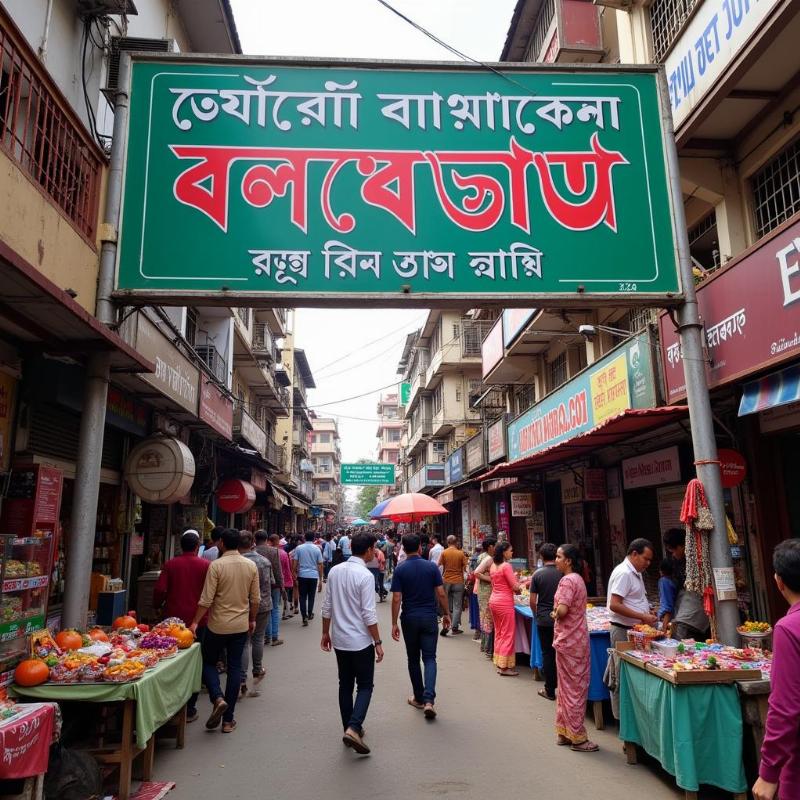The phrase “place Bengali meaning” typically refers to understanding the Bengali word for “place,” which is স্থান (sthan). However, depending on the context, other Bengali words can also convey the meaning of “place,” such as জায়গা (jayga) – meaning space or location, or ঠিকানা (thikana) – meaning address. This article delves deeper into the nuances of “place” in Bengali, exploring its various interpretations and cultural significance for travelers interested in West Bengal and Bangladesh. Let’s uncover the rich linguistic tapestry surrounding “place” and its relevance to experiencing Bengali culture firsthand.
Exploring the Different Meanings of “Place” in Bengali
The Bengali language, like any other, has multiple ways to express the concept of “place.” While স্থান (sthan) is the most common and literal translation, other words add shades of meaning that enrich the understanding of location within a Bengali cultural context. Let’s look at some of these words and their usage.
- স্থান (Sthan): This term refers to a specific location or position. Think of it as the equivalent of “spot” or “site.” For example, a historical landmark would be a স্থান (sthan).
- জায়গা (Jayga): This word is closer to the English word “space” or “area.” It indicates a more general location, like a neighborhood or a region. If you’re asking for room to sit, you’d use জায়গা (jayga).
- ঠিকানা (Thikana): This word signifies “address” and provides a precise location, often used for mail or finding someone’s home.
Understanding these different words for “place” can be incredibly helpful for travelers navigating West Bengal or Bangladesh. It allows for clearer communication and a deeper appreciation of the local nuances.
 Bengali street market sign with location details
Bengali street market sign with location details
Beyond Simple Location: “Place” and Bengali Culture
“Place” in Bengali culture goes beyond mere geography; it’s deeply intertwined with emotions, identity, and community. The concept of “desh” (দেশ), meaning country or homeland, evokes a powerful sense of belonging and often refers to both Bangladesh and West Bengal, highlighting a shared cultural heritage.
- Neighborhoods (Para): The “para” (পাড়া) or neighborhood forms the core of social life, where generations of families live together and share a strong sense of community.
- Hometown (Janmabhoomi): The place of one’s birth (janmabhoomi – জন্মভূমি) carries significant emotional weight and often remains a cherished memory throughout life.
- Sacred Spaces (Tirthas): Religious sites and pilgrimage destinations (tirthas – তীर्थ) hold immense spiritual significance, attracting devotees from all over. These “places” represent a connection to the divine and offer solace and blessings.
How Understanding “Place” Enhances Your Travel Experience
Knowing the Bengali words for “place” isn’t just about linguistic accuracy; it enriches your travel experience in numerous ways. It facilitates communication with locals, allows you to ask for directions more effectively, and helps you understand cultural nuances. Imagine being able to ask a local about their “para” (neighborhood) or expressing interest in visiting a significant “sthan” (site), building bridges and fostering meaningful connections.
What are some common phrases related to “place” in Bengali?
Here are a few helpful phrases:
- “Where is this place?” – এই জায়গাটা কোথায়? (ei jaygata kothay?)
- “What is the address of this place?” – এই জায়গাটার ঠিকানা কি? (ei jaygatar thikana ki?)
- “I’m going to my hometown.” – আমি আমার জন্মভূমিতে যাচ্ছি। (ami amar janmabhumite jacchi)
Conclusion: “Place” – More than Just a Word in Bengali
“Place Bengali meaning” encompasses a rich tapestry of linguistic and cultural significance. From the literal translation of স্থান (sthan) to the emotional weight of “desh” (দেশ) and the community spirit embedded in “para” (পাড়া), understanding the various nuances of “place” allows travelers to truly immerse themselves in the vibrant culture of West Bengal and Bangladesh. Embrace the linguistic diversity and explore the deeper connections to “place” that await you on your journey.
FAQ
- What is the most common Bengali word for “place”? The most common word is স্থান (sthan).
- What is the difference between স্থান (sthan) and জায়গা (jayga)? স্থান refers to a specific spot, while জায়গা refers to a more general area or space.
- How do I ask for directions in Bengali? You can say “ei jaygata kothay?” (এই জায়গাটা কোথায়?) which means “Where is this place?”
- What does ঠিকানা (thikana) mean? ঠিকানা (thikana) means “address.”
- What is the cultural significance of “place” in Bengali culture? “Place” is deeply tied to identity, community, and often has strong emotional connotations.
- What does “desh” (দেশ) mean in Bengali? “Desh” means country or homeland, and often refers to both Bangladesh and West Bengal.
- What is a “para” (পাড়া) in Bengali culture? A “para” is a neighborhood, representing a close-knit community.
PlaTovi is your trusted travel partner for exploring the wonders of India and beyond. We specialize in crafting unforgettable travel experiences, from traditional tour packages (sightseeing, dining, and shopping) to customized itineraries tailored to your specific needs. We also offer hotel & resort bookings, international & domestic flight bookings, event & wedding planning, car rentals & airport transfers, and visa & documentation assistance. For inquiries about planning your next adventure, especially to experience the beautiful landscapes and rich culture of West Bengal and Bangladesh, connect with us! Email: [email protected], Phone: +91 22-2517-3581. Let PlaTovi help you discover your next favorite “place”!